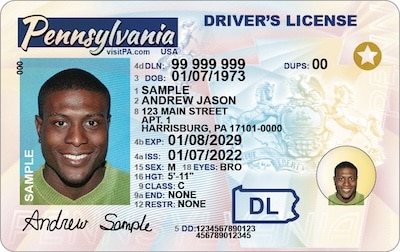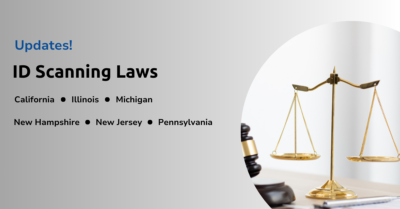Overview of Pennsylvania ID scanning laws
Pennsylvania has 5 laws which we consider relevant to ID verification, in addition to other laws which may related to age verification, identity verification, KYC, privacy, and biometrics. There are currently 3 relevant law in progress, several of which have multiple implications as they would change the ID verification or ID scanning requirements for multiple use cases.
Can you scan IDs in Pennsylvania?
Yes. Pennsylvania law does not regulate a business’s practice of scanning IDs, other than to require it in certain instances.
Can you save data from a scanned ID in Pennsylvania?
Yes. There are no current laws which limit or restrict saving data from a scanned ID in Pennsylvania.
Does Pennsylvania offer affirmative defense for ID scanning?
Yes. Pennsylvania offers affirmative defense for ID scanning for alcohol sales.
What types of IDs does Pennsylvania issue?
Pennsylvania issues drivers licenses and state IDs, including REAL ID, and CDLs. Pennsylvania does not issue non-domiciled CDLs. A Pennsylvania mobile ID is in development.
Individual Pennsylvania ID verification laws
ID scanning for alcohol sales
Pennsylvania offers affirmative defense if a “transaction scan device” is used to verify the photo ID before alcohol sale.
ID scanning for canned cocktails & to-go drinks
Pennsylvania requires ID scanning for the sale of “to go” alcoholic beverages and canned cocktails. Amended 6/2024
Age verification for tobacco sales
Pennsylvania does not require ID scanning for tobacco sales but offers an affirmative defense if an ID check can be proven.
ID scanning for alcohol sales at amusement parks
Pennsylvania requires use of an ID scanner for alcohol sales in public venues such as amusement parks.
ID verification for sale of controlled substances
Pennsylvania requires that information from the buyer’s ID be entered into a state tracking system for sale of methamphetamine precursors.
DMV data verification for vehicle sales
PennDOT requires that a DMV data verification be performed to coincide with every vehicle sale. Effective November 1, 2022.
ID scanning for firearms sales at gun shows
In 2023, Pennsylvania introduced legislation that would require electronic ID scanning for sales of guns at gun shows.
Age verification for social media
A bill that would require age verification for social media sites is currently in the Pennsylvania Senate.
Age verification for adult websites
A Pennsylvania legislator has said they intend to introduce legislation that would require age verification for access to pornographic content.
Data privacy laws in Pennsylvania
Pennsylvania’s Consumer Data Privacy Act (PCDPA) passed the Pennsylvania House of Representatives in March 2024. House Bill 708 aims to enhance consumer data protection. The bill imposes specific duties on businesses that control or process consumers’ personal data, requiring them to implement measures safeguarding this information. It also outlines enforcement mechanisms and penalties for non-compliance, establishing the Consumer Privacy Fund to support these efforts. If enacted, businesses operating in Pennsylvania will need to review and possibly adjust their data handling practices to align with the new legal requirements.




